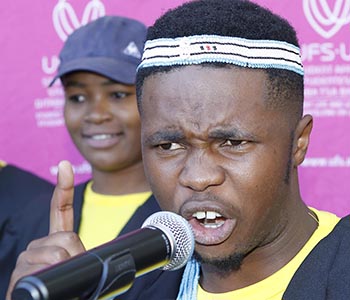Latest News Archive
Please select Category, Year, and then Month to display items
02 January 2025
|
Story Gerda-Marie van Rooyen
|
Photo Supplied
 Leading the research in South Africa is Prof Linus Franke from the Department of Soil, Crop and Climate Sciences.
Leading the research in South Africa is Prof Linus Franke from the Department of Soil, Crop and Climate Sciences.
Scientists are actively pursuing the successful breeding of diploid hybrid potatoes from inbred lines. This is expected to revolutionise potato breeding as it holds the key to rapid genetic progress. It will introduce new varieties for commercialisation through seed. Currently, existing potato variants have a gene that renders self-pollinated seeds infertile.
Prof Linus Franke, an academic in the Department of Soil, Crop and Climate Sciences at the UFS, is leading the research in South Africa. “This technology allows the production of genetically uniform potato seed that is easy to transport and largely disease-free.” He says this differs from conventional breeding whereby only vegetative propagation is possible due to tetraploid varieties in potatoes. It also risks carrying pests and diseases from one generation to the next – leading to the accumulation of pests and diseases with each round of multiplication.
Seed innovation
Prof Franke explains that Solynta BV, a seed company based in the Netherlands that produces potato varieties that can be grown from seed, has included South Africa in their research efforts because it is one of Africa’s largest producers and exporters. Through his academic relationship with Wageningen University and Research, a Dutch institution renowned for its agricultural endeavours and food production, the UFS became involved in researching hybrid potatoes grown from seed.
Diploid seeds containing two sets of chromosomes allow easier gene manipulation to increase predictability and speedier genetic progress. The breeding approach enables the incorporation of tolerance to pests, diseases, abiotic stresses (cold, heat, drought) and other desired genetic traits.
Although Prof Franke is optimistic about this research, he is not blind to disadvantages. “Potato seeds are tiny and have little energy reserves, making it harder to grow potatoes from seed than from tubers.” He says potatoes from seed will take longer to cultivate than tubers, as farmers need to grow plantlets from seeds first, adding six weeks to the growing period. “It is possible that commercial farmers can grow potatoes directly from seed. Alternatively, perhaps more likely, specialised growers will produce tubers of potatoes from seed; these tubers are then sold as seed tubers to other potato farmers, who then continue their normal practices of producing potatoes for the market from tubers.”
Financial benefits
Prof Franke says farmers have reason to get excited. “Seed potatoes will reduce input costs, as varieties with enhanced tolerance to pests and diseases require less pesticides. Planting one hectare of potatoes requires three to four tonnes of potato tubers, but only one 25 g packet of potato seeds.” Since potatoes are a more valuable commodity than maize, this technology might also increase farmers’ income potential.
SRC President to advocate for all students during term
2017-04-10

Skhululekile Luwaca, the newly elected SRC President
on the Bloemfontein Campus.
Photo: Johan Roux
With a grateful heart, Sikhulekile Luwaca takes up his position as Student Representative Council (SRC) President on the Bloemfontein Campus, after the results of the election were announced on 29 March 2017.
An integrated leader
Sikhulekile, known as SK among his peers, said that as a leader, he needed to integrate himself with the student community, and from there he would have the influence to make an impact on society. “I believe in being an open-minded leader who is open to engagement and peaceful resolutions.”
SK said he would like to represent the interest of all students and invited them to raise their concerns. By the end of his term, he wanted to have achieved a number of goals, which include the integration of off-campus students and to provide a shuttle service for them. He said he also wanted to establish and launch an SRC fund. Furthermore he plans to make sure that all structures of student governance are functional, to name but a few.
2017 SRC candidates
The SRC members at the Bloemfontein Campus are:
President: Sikhulekile Luwaca
Vice-President: Surprise Manyaiyi
Secretary: Nothando Hlophe
Treasurer: Ntombi Nhlapo
Student Development and Environmental Affairs: Silindelokuhle Mthethwa
Transformation: Mathlodi Leteane
Arts and Culture: Joseph Ntebele
Sport: Nombulelo Booi
Media and Marketing: Refilwe Motsumi
Student Accessibility and Support: Donald Litsoane
Legal and Constitutional Affairs: John Modukanele
First Generation Students: Mohau Lesebo
Academic Student Council: Sekese Rasephei
Rag and Community Service: Gert Jan van der Walt
Day Residence and Commuter Student Council: Gontse Choane
Postgraduate Student Council: Mpoi Makhetha
International Student Council: Takudzwa Nyamunda
On Campus Residence Council: Natasha Kabaso
Dialogue and Associations Council: Asive Dlanjwa
Student Media Council: Puseletso Mashego